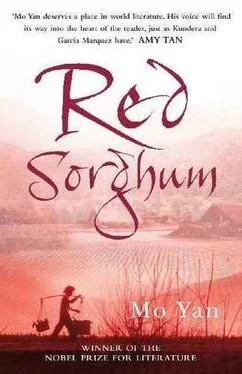The battle cries were followed by bugles and then the rat-tat-tat of what sounded like a couple of heavy machine guns.
Granddad and Father ran toward the source of the noise as fast as their legs would carry them. When they arrived at the spot, it was deserted; they found amid the sorghum stalks two steel oil drums in which strings of firecrackers were exploding.
‘Only the Jiao-Gao regiment would pull a stunt like this,’ Granddad said, with his lip curled.
The Jap cavalry and puppet foot-soldiers sprayed the area with fire as they made a flanking movement. Granddad retreated, dragging Father with him. Several Jiao-Gao soldiers ran towards them at a crouch, grenades hanging from their belts. Father saw one of them kneel and fire towards a clump of sorghum stalks shaking violently under the charge of a stallion. The ragged gunfire sounded like an earthenware vat being smashed. The soldier tried to pull back the bolt of his rifle to eject the spent cartridge, but it was jammed. The warhorse bore down on him. Father watched the Japanese rider wave his glinting sabre and cut through the air, barely missing the soldier’s head. The man threw down his rifle and ran, but was soon overtaken by the galloping horse, and the sabre came slicing down through his skull, soaking nearby sorghum leaves with his gore. Father saw nothing but inky darkness as he slumped to the ground.
When he awoke, he had been separated from Granddad by the Japanese cavalry charge. The sun bore down on the tips of the sorghum, casting dark shadows around him. Three furry fox cubs darted in front of him, and he instinctively grabbed one of the bushy tails. An angry growl erupted from nearby stalks, as the mother fox leaped out of the cover, baring her fangs threateningly. He quickly released the cub.
Gunfire continued at the eastern, western, and northern edges of the village, as a deathly stillness enveloped the southern edge. Father called out softly, then began to shout at the top of his lungs. No reply from Granddad. A dark cloud of fear settled over his heart as he ran panic-stricken towards the sound of gunfire. Dimming rays of sunlight bathed the sorghum tassels, which suddenly seemed hostile. He started to cry.
Searching for Granddad, Father stumbled across the bodies of three Jiao-Gao soldiers, all hacked to death, their hideous faces frozen in the gloomy darkness. He then ran smack into a crowd of terrified villagers cowering amid the sorghum stalks.
‘Have you seen my dad?’
‘Is the village open, boy?’
He could tell by their accent that they were from Jiao County. He heard an old man instructing his son: ‘Yinzhu, remember what I told you. Don’t pass up quilt covers, even if the cotton’s all tattered. But look first for a cookpot, because ours is ruined.’
The old man’s rheumy eyes looked like gobs of snot stuck in the sockets. Having no time to waste on them, Father continued north. When he reached the edge of the village, he was confronted by a scene that had appeared in Grandma’s dreams, and Granddad’s dreams, and over and over in his own. People were pouring out through the village wall — men and women, young and old — like a raging torrent, heading for the sorghum fields to escape the heavy fighting on the eastern, northern, and western edges of the village.
Gunfire erupted in front of Father, who saw a hail of bullets rip into the sorghum field that dominated the front of the village. The villagers — men and women, young and old — were mowed down along with the sorghum stalks, every last one of them. The air was spattered with fresh blood, turning half the sky red. Father sat down hard on the ground, his mouth hanging slack. Blood everywhere, and everywhere its sweet stench.
The Japanese entered the village.
The sun, stained by human blood, set behind the mountain as the crimson full moon of mid-autumn rose above the sorghum.
My father heard Granddad’s muted call:
‘Douguan —!’
IN THE CRUEL fourth lunar month, frogs lay their transparent eggs in the Black Water River under radiant starlight. Then, in the sweltering heat of the sun, swarms of inky-black, squirming tadpoles emerge into the warmth of water that looks like freshly extracted bean oil to form inky-black schools that swim with the slowly flowing river. Dog-turd reeds grow in profusion on the banks; wild mustard flowers so red they seem purple bloom furiously amid the water grasses.
It was a good day for birds. Clay-coloured larks covered with white dots soared in the high sky, filling the air with shrill cries. Glossy swallows skimmed the mirror-like surface of the river. The dark, rich soil of Northeast Gaomi Township revolved ponderously beneath the birds’ wings. Hot winds from the west rolled across the land, and murky dust clouds attacked the Jiao-Ping highway.
It was also a good day for Grandma. Granddad, who had joined the Iron Society, eventually replacing Black Eye as its leader, was about to fulfill his promise to give her a proper funeral, now that nearly two years had passed. News of the impending ceremony had spread a month earlier among the villages of Northeast Gaomi Township. The eighth day of the fourth lunar month had been chosen. By noon of the seventh day, donkey carts and ox carts began arriving, carrying common folk from far away, including wives and children. Hawkers and peddlars had a field day. On the streets and in the shade of trees at the head of the village, dumpling peddlars set up their earthen stoves, flatcake vendors heated their pots, and cold-bean-noodle stands with white canvas awnings were thrown up. Grey hair and ruddy cheeks, men, women, boys, and girls, seemed to fill every inch of space in our village.
By the spring of 1941, the Leng detachment and the Jiao-Gao regiment had worn each other down with their frequent clashes, and had been further harassed by the systematic kidnappings by Granddad’s Iron Society and an annihilation campaign by the Japanese and their Chinese puppet troops. The Leng detachment apparently had fled to the Three Rivers Mountain region of Changyi to rest and build up their strength, while the Jiao-Gao regiment hid out in the Great Marshy Mountain region of Pingdu County to lick its wounds. The Iron Society, under the leadership of Granddad and his erstwhile romantic rival, had grown, in a little over a year, into a force of over two hundred rifles and fifty or more fine horses; but their movements were so secretive and so shrouded in religious superstition that the Japanese and their puppets seemed to take no notice of them.
In national terms, 1941 witnessed the cruellest stage of the war of resistance against Japan; the people of Northeast Gaomi Township, however, enjoyed a brief respite of peace and quiet. The survivors planted a new crop on top of last year’s rotting sorghum. The seeds were barely in the ground when a light but adequate rain fell to soak the thirsty earth. Then the radiant sun took over, and, seemingly overnight, tender shoots covered the ground. Drops of fragrant dew were impaled on the tips of delicate red shoots. Grandma’s funeral fell on a day of rest for the farmers.
On the evening of the seventh, the area around the village walls was packed with people, while dozens of wagons, their donkeys and oxen tethered to trees and axles, were lined up on the dusty street. The setting sun shone on the glossy spring hides of livestock and turned immature leaves blood-red, their shadows ancient coins stamped on the animals’ backs.
As the sun fell behind the mountain, an herbal physician rode his mule into the village from the west. Clumps of bristly hairs emerged from the blackness of his nostrils; his scalp and forehead were covered by a tattered felt cap, out of place on this late-spring day, and a sombre glare radiated from beneath his slanting eyebrows.
Читать дальше












